Chapter 5
The Top Secrets from Our Centenarians
SECRET 1: ATTITUDE
SECRET 2: HEALTHY EATING
SECRET 3: FAITH
SECRET 4: EXERCISE AND ACTIVITY
SECRET 5: CLEAN LIVING
SECRET 6: FAMILY
SECRET 7: GENETICS
ADVICE TO CENTENARIAN WANNABES
WHY 100?
In 1513 Ponce de Leon began searching for the legendary Fountain of Youth, and ever since then people have been intrigued—in many cases obsessed—with discovering the mystical “secret formula,” “magical pill,” or “eternal elixir” for extending life into a perpetual panoply of blissful youthful existence. Whenever we mention our research and interest in centenarians to anyone anywhere, the immediate first question that everyone wishfully asks is: “What’s the secret?” We always smile and calmly suggest, “Read our book.”
As you have read through the pages of Celebrate 100 to this point, we hope you have gleaned that there is—in our opinion, at least—no single secret to making it 100-plus years. As we extensively articulated in Chapter 2, many factors contribute to the centenarian “formula,” and hundreds of millions of dollars have been and continue to be invested into serious scientific and medical research in an effort to determine the key marker(s), factor(s), secret(s)—whatever you wish to label them—that will enable people to extend life to 100 and even well beyond that initial notable benchmark of aging. The majority of centenarian research we have observed throughout the scientific, medical, and general media has focused on the roles of diet, exercise, social relationships, and inherited DNA as it pertains to your likelihood of extending life and achieving the 100 milestone. Not only are we the biggest cheerleaders and encouragers of this funded research, but we want to be first in line to take “the pill” or whatever regimen that provides high probability of centenarian and supercentenarian achievement.
Our research efforts have been less rigorous quantitatively, scientifically, and medically, but more focused on narrative, historical recounting, and qualitative thought and perspective directly from the 500-plus centenarians we have personally interviewed, videotaped, and surveyed. We have not taken blood or DNA saliva samples, measured heart rates and blood pressure pre-post rigorous exercise routines, or administered psychosocial instruments measuring longitudinal stress levels or interactive family/social dynamics. These are all necessary and important quantitative scientific research methodologies that can enlighten our society about aging possibilities and lead willing participants to longer lives of healthy living.
However, we have extracted hundreds of hours and a few thousand pages of fascinating stories from the heart, memories from the mind, and nuggets of century-old wisdom and advice that are instructive, commonsensical, helpful, encouraging, motivational, and inspirational to everyone who will incorporate them into their daily dosage of living.
This chapter will offer the “distilled essence” of our qualitative centenarians’ responses to the question we asked of them about their perceived “secrets” for living such long and productive and enjoyable lives. In a sense, we are trying to present to you a smorgasbord, or perhaps a rainbow of secrets that both scientific/medical research and our narrative/historical recounting research has yielded. Until we learn more and discover the definitive quantitative formula for vastly extended longevity, you may select and prepare your own diet or pick your own colors and paint your personal picture for living many more years than you contemplated before reading Celebrate 100.
If you choose and implement with enthusiastic anticipation, the journey will be a long and lovely joy ride, delicious and colorful, worthy indeed of wonderful celebration.
On the Internet you will find hundreds of articles and highlights of research reports offering a plethora of clues, tips, steps, ideas, suggestions, and so on for how to reach the magical age of 100. This literature addresses your family genetic history, gender, exercise regimen, social interaction, levels of worry, age of childbearing, weight, diet, attitude, and a host of other sound bites, all of which may be helpful to your centenarian journey. Our approach was to simply ask each centenarian we interviewed and/or surveyed the simple question: “What is your secret to living to be 100?” (Or whatever their current age was at the time of questioning.)
Many gave immediate answers with incredible levels of confidence and resolve. For instance, supercentenarian Dr. Denmark, 114, immediately informed us her secret was drinking only water since she was seven months old. Lois Jones, 107, replied that eating chocolate and sipping a little wine daily was her secret. Some would initially suggest they didn’t have any secret(s) or have any idea how they had lived so long. But on gentle prodding and insistence, we captured a perceived answer from almost 100 percent of them. By design we had established no predetermined set of categories. Our goal was to ask them the simple question, register their response, and create the categories as they evolved.
As we tabulated all the responses, seven “categories” of perceived secrets, from the centenarians themselves, emerged in rank order of importance. Granted, this is not rigorous, quantitative scientific research, but we believe it is very important, informative, and encouraging as you seek to assemble your own “menu” or paint your personal “picture” of a centenarianship quest. These category labels are ours, not necessarily theirs, but we hope they communicate to you the distilled essence of their self-perceptions and answers.
SECRET 1: ATTITUDE
Almost 100 percent of our centenarians believe a positive attitude about life is important, if not essential, to success and longevity in life. Over time, their attitudes have changed and expanded as a function of emotional responses, behavioral tendencies, and deeply held personal beliefs. Most of them have acute perceptions, are very discerning—we like to call it savvy—and possess a uniquely wise understanding about life that perhaps only a century-plus of living can provide. As Loren Greiner, 100, shared with us, “I am pleased to be a centenarian. My thinking power perspicacity (intelligence manifested by being astute) seems to be holding up.”
We marveled at the positive mental attitudes of most centenarians we met. About half of our centenarian class described themselves as optimistic, and the other half labeled themselves as realistic, in a positive sort of way. Over 60 percent claimed the label happy when we asked them to pick a word or two to describe how they have felt and still feel about life after so many years. Many others endorsed the words content, hardworking, thankful, level-headed, adventuresome, and caring to frame their outlook. Whether optimistic or realistic, these special people have become productive human beings who have progressed far up the attitudinal developmental ladder. Indeed they are mature citizens who embrace all that life offers with an attitude of gratitude.
We recognize some people argue that positive mental attitude is tough to measure or quantify, but we can assure you that “you know it when you see and experience it.” One centenarian pointed out that there are essentially two kinds of people: Those that wakeup in the morning and enthusiastically say “Good morning, God!!” and those that begrudgingly wake up thinking, “Good God, morning,” with a sour demeanor. Most of our centenarians are “Good morning, God” people even though they have lived through the Great Depression, multiple wars and recessions, financial and health challenges, and personal heartaches, just like many of us. The majority embrace each day of life as a gift and a blessing to be savored and enjoyed to the fullest.
For the most part they have mastered the art of not worrying, even though they have had plenty to worry about over a century. They just chose not to sweat the big or small stuff. Many of them pointed out to us that attitude is a choice. It’s up to you. Nobody else can choose or do it for you, no matter what your personal circumstances. They have chosen to embrace a positive, refreshing, thankful attitude toward life. The large majority of our centenarian class said this was their number one secret to their long and productive and enjoyable lives.
“I think stress will kill you.”
Ethel Barnhardt, 101
“If you have peace of mind, that’s all.”
Elsie Rich, 106
“Worry isn’t helping the situation any, and if you can’t do anything, forget about it because worry only brings lines to your face.”
Elsa Hoffman, 102
Harold Rowe
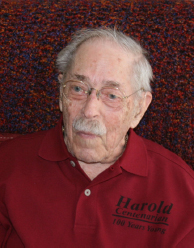
We hope you will emulate our centenarians and learn the discipline of not worrying. It just may be your most important discovery to centenarian achievement. And as our wise elders have insisted, “It’s up to you.”
Harold Rowe has one of the most positive “can do” attitudes we encountered in our travels throughout the country. Born near Troy, New York, in 1910, he started Rowe’s Cleaners, which he ran for 35 years. Then he began a second career with the county sheriff’s office using his photographic skills for criminal investigation and documentation. He is a life member of the Troy Elks Lodge 141, where he has served in many different capacities. Harold also founded the St. Jude’s Horse Show to raise funds for his church and school, and worked with the Boy Scouts of America for over 50 years. If anyone deserved to be featured on the Smucker’s jar with Willard Scott on the Today show, it has to be Harold—and he was in 2010 on his actual birthday, March 3.
He told us that his secret for making it to 100 is “working hard and taking care of your health.” With a great deal of humility and well-deserved pride, he shared with us how he started his first of several careers that extended late into his 90s.
“I was driving a truck for another dry cleaner and I was getting $20 a week. I said, ‘Geez, I ought to be able to do something better than this,’ so I got to know all the customers. I had $25 in my pocket. I borrowed $100 and I started in business and I ended up over $100,000 in debt.” Most people would have thrown in the towel and probably declared bankruptcy at this point, but Harold’s determined optimism and achievement attitude pushed him forward.
“But I worked out of it. I worked at that business 35 years. It started in a little hole in the wall and ended up in a two-story brick building that used to be a hotel. I had 16 people working for me and I had two trucks.”
When the Depression hit, his “can do” attitude and persistent hard work continued to reward him. “I prospered under the Depression by building my business up. I don’t know how, I was just terribly lucky. People were suffering and I was getting better. I worked like the devil.”
Like most of our centenarians, Harold really enjoyed his work in spite of the long hours and tough times through the Depression because “I was accomplishing something.” After leaving the dry cleaning business, he took his love of photography and went to work with the sheriff’s department, where he worked until he was 72. “I was supposed to retire at 70, but due to my ability the sheriff wrote a letter to the state requesting an additional year and they granted it. Come another year, they wrote another letter and they granted it again. On the third year, the state said ‘no,’ that I was supposed to retire at 70 and they thought I had done my job.”
You catch a little more of a glimpse of Harold’s tenacity, optimism, and attitude toward life and work with his final “chapter” of employment. “I would have liked to continue working (for the sheriff’s department), but when I left there I went to work for an undertaker. I drove the hearse and I worked there for 20 more years. That’s when I retired.”
When we asked him why he wanted to continue working so long with such energy and devotion, he humbly replied, “I wanted to get ahead. I wanted to be proud of myself. I enjoyed my work—it was a learning process. If you don’t enjoy getting up and going to the office, don’t do it.”
Moving to Georgia to live with his daughter and son-in-law after 96 years, no wonder his hometown of Wyantskill, New York, misses this leader and landmark of their community. But, according to Harold, being married to his lovely wife Julia for 76 years was one of his greatest accomplishments.
SECRET 2: HEALTHY EATING
Hundreds of books, thousands of articles, millions of commercials, and billions of dollars flood our society promoting the benefits derived from eating healthy foods. The overused familiar adage “You are what you eat” has never been more omnipresent from dining rooms to schoolrooms to boardrooms. The Food Network is one of the most popular cable channels, viewed by tens of millions of people daily. And as our dear friend Truett Cathy, founder of Chick-fil-A insists, “Food is essential to life, therefore make it good.”
Dining, Not Dieting
Now please note that diet was not the second-highest perceived secret for longevity by our centenarians. It was healthy eating in moderation. We asked every centenarian if they had ever been on some sort of controlled diet program—Weight Watchers, Nutrisystem, Jenny Craig, and so on. An overwhelming 78 percent responded that they have never been on any kind of what we would call a diet program or plan.
Most of them have always eaten, and still do eat, whatever they want in reasonable, moderate portions. As Daniel Merlini says, “Eat whatever you want to eat, just eat less. That’s all you gotta do.”
Their menus cover most of the food chain: water, wine, coffee, chocolate, red meat, fish, chicken, barbecue, fruits, vegetables, hot dogs, hamburgers, candy, desserts, ice cream—the entire culinary kaleidoscope. A few of our centenarians are vegetarians, but the majority are carnivores—although in moderation. And many of them still cook. Les Oldt, 107, bakes bread regularly and serves up some lip smackin’ ribs almost monthly. Don Robinson, 105, still loves to go shopping and prepare a lot of his meals at home.
And remember the sound advice of Helen Toomey, 104: “Chew your food. Don’t just take a bite and swallow it.”
“Eat the right foods and exercise,” says Anna Orr, 100.
Lessie Smithgall said with a laugh, “Saving water and drinking wine. I have had a good diet all my life. I have taken good care of myself.”
Jim Kelly, 101, was as pointed as one can get: “You have to try and have good health. And you cannot have good health if you try to drink a lot or booze or you try to take drugs. You just make sure you get a good piece of bread and a cup of coffee.”
Scout’s Honor
In 2007 Marianne Crowder was hailed as our nation’s oldest living Girl Scout. She was born in Colorado Springs, where she grew up and acquired a love for dance, which motivated her to open and operate her own dance studio and head the dance department for Colorado College before marrying and moving to California in 1939. Marianne taught in Stanford University’s drama department for 19 years and choreographed dances for many major productions of the drama and music departments. She continued teaching dance until she was 97 years young and still lives independently in her lovely home in Palo Alto, California.
Marianne Crowder
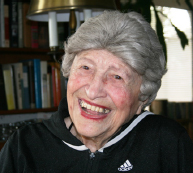
When we met her at the door, it was shocking to see someone look so fit and at least 25 years younger than what we knew her actual age to be. Her secrets to 100-plus years with such youthful appearance and vitality were several. “I think dance has really helped. I have a good disposition and I’ve had a good life. Whatever I’ve gone into has been successful. I have no complaints.”
We inquired if she has ever followed any special diet regimen to generate such vitality. “No. I don’t like fatty foods and I don’t like a lot of meat. I’m sort of squeamish unless it is something nice. I eat mostly fruits and vegetables. I’m not keen about fish. I like steak (she says with a wink and smile). Well, what other kind of meat is there?!”
Living at home, she still prepares most of her own meals. “I was a good cook, but I didn’t favor being a cook. I really do like simple food—but it can be too simple (she says with a laugh). I always eat breakfast. I have always liked outdoors and do a very little bit of gardening. I used to sew and knit very well. And I read volumes; I like biography.”
Asking about her greatest successes in life, she responded with pride and appreciation: “Well, I’ve always been on top. If it’s dance, I’ve been the best. If it’s Scouts, I’ve had the highest honor. It hasn’t been that I thought I was better, it’s just that it’s been more fun for me and I had a gift for it.”
Scouts and dance were great avenues for her to stay active and in shape, but dance brought her the most joy in life. As she entered the decade of her 80s, she published a book and video entitled Mariantics, which describes and demonstrates dozens of exercises and nutritional suggestions to keep you in shape for life. And she is living proof of her work. “I feel 40-something in my mind,” she says with a smile. We asked for copies of her book and video!
SECRET 3: FAITH
Faith in God or a higher power was prevalent among the majority of our centenarians. Mostly coming from many Judeo-Christian backgrounds, they expressed extreme gratitude to God or their higher power and attributed their faith as the secret to their extended years of enjoying family, friends, careers, travels, and activities. Dozens articulated how their strong faith has sustained them through both good and excruciating circumstances: from surviving a Nazi concentration camp in World War II to overcoming tragic family losses and life-threatening illnesses during their century of living. And while enjoying life today with a positive attitude, most look forward to their “next chapter” of life, which is a foundational cornerstone of their faith.
Ruth Crumley
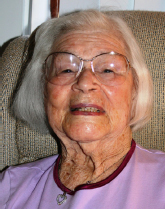
Ruth Crumley, 101, simply smiled and exclaimed, “I don’t have a secret. The Lord just hasn’t called me yet.”
Emma Victoria Johnson brought a laugh when she insisted, “The Lord doesn’t want me (yet), and the devil doesn’t want me either!”
Eloise Wright, 100, shared her secret with a warm smile, “Being a servant to others and letting the Lord take care of me.”
Harry Steine, 100, was brief: “Do your best and trust in the Lord.”
And Louis Reitz, 101, summed it up: “God is there. Contact Him.”
Ora et Labora—Pray and Work—Till Death Do Me Part
Reverend Luke Kot, the oldest of a fellowship of Trappist monks at the Monastery of the Holy Spirit in Conyers, Georgia, is still going strong at 101. Our visit with him was truly inspiring and instructional as he shared with us his life before and after coming to Georgia and helping build the monastery beginning in 1944. He enthusiastically and energetically lives his life by a centuries-old motto: Ora et Labora, which means “Pray and Work.” And he starts early. “We used to get up at 2:00 A.M., and sometimes 1:30 and even 1:00 A.M. Now we get up around 4:00.” Kot lives with the 40 monks who share his faith and enthusiasm for prayer and work, praying seven times daily together.
Reverend Luke Kot
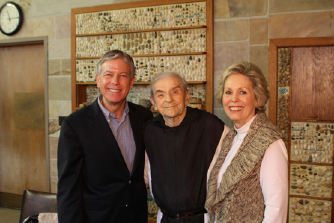
Brother Luke, as some choose to call him, was born in Montana, the son of Polish immigrants. “The young boys would shout out at me, ‘A cowboy, a cowboy.’” He had three sisters, all of whom lived very long lives. His father lived to be 94, and his mother 86.
When we inquired how he decided to become a monk, his story was intriguing. “I knew that I wanted to be a monk from the time that I was seven years old. There were factories around us (his family had moved to Niagara Falls, New York, by that time). I wanted to get an education first, so I went to high school but I knew I didn’t want to go to college. My purpose was I wanted to work in a factory for at least five years before I joined a monastery.” We asked why he wanted to delay his entering the ministry, and his answer was surprising and refreshing.
“I worked five years purposefully so people couldn’t say I was a lazy type of person and just wanted to go to the monastery. I did the most common work. I swept floors. The manager came to me one day and said, ‘I’ve never seen anyone with so much work and passion with a broom. You’re the first person to keep the floor clean. You’ve done an excellent job.” With a grin, he continued, “I took the lowest job. They wanted to promote me. I didn’t want it. I wanted to stay in that common job. Then I went into the monastery and have been here till this day—over 73 years.”
Along with the other monks who came to Conyers from Kentucky, he helped build the monastery literally from the ground up. “I laid stones and built a wall. Work to me—laying stones and cinder block—was joy and happiness. I liked it. I didn’t mind it. Work was never a curse to me. It was always the best thing in the world because God created us for good works.”
We asked him what is the greatest thing about living to be 100 and he shared: “Just living life and enjoying it while you have the grace of God to live. You should be happy about life and not disappointed because you are aging. That has never bothered me. When I wanted to join the monastery (most were in Europe at the time), I happened to mention to the Lord that ‘if you find a monastery in the United States, please let me know and I will enter “till death do me part.”’ And He took those words and that’s the reason I’m living so long. He’s holding me up because He’s making me live those words out!”
He went on to share his secret to long abundant life that pertains to all of us. “In the first chapter of the St. John’s gospel, he has a little sentence in there. It says—God is love. Period. And if God is love, He loves us so much and He wants that love back to Him. So He puts us for a short period of time on this Earth and we have to prove that we love Him, too. And we have a place to test this in this life. If you are doing that, loving others, then blessed are you because you are living and doing what He expects of you . . . so you can have life eternal hereafter.”
All we could think to say in response was “Amen!”
SECRET 4: EXERCISE AND ACTIVITY
Like we do with food and diets, Americans spend billions of dollars annually on exercise equipment and programs to look good, stay in excellent physical shape, feel better physically and mentally, and, ideally, live longer. This is a very positive trend to overcome the obesity and unhealthy eating habits affecting our population. Exercise and activity ranked fourth in our centenarians’ frequency of perceived secrets for their exceptional longevity. But their definition or approach to this category of secrets is not quite the same format most of our younger generation approach exercise and activity.
Less than 30 percent of our centenarians have ever been on any kind of prescribed or special exercise program or regimen. The ones who have experienced those professionally designed and administered programs have very much enjoyed them and feel they have greatly benefited from their commitment to and involvement in them. But for the vast majority of our research group, their “exercise” was simply part of their ordinary daily work activities, whether on the farm or in the cities. Very few were joggers or cyclists, but most were walkers—in many cases, looooooooong walkers—crop pickers, sweepers, window washers, stair climbers, gardeners, chore performers, or whatever their home or business circumstances demanded. Most of them have stayed mentally and physically active in their “gymnasiums” of everyday life. As we cited in an earlier chapter, many worked well into their 80s or 90s, and some into their centenarian years. Many still cook, walk, read, attend cultural events, and engage in active social settings to stimulate their mental and physical faculties.
Garnett Beckman, 101, astutely suggested, “Keep moving or you cannot keep moving.”
“Enjoy life, be active in sports to keep up your physical condition, no smoking, moderate drinking,” suggests Noah Dupont, 101.
Active “Mermaid”
Helen Hannah’s four lovely daughters describe her as “fiercely independent,” which is part of her makeup that has kept her so alive and active for over 100 years. At her fabulous centenarian birthday party, over 150 friends and family from all over the country came to celebrate this gifted lady, and she exclaimed, “I was 25 years younger on that day than I am now!”
When we visited Helen in the lovely Atlanta home she has lived in since 1951, we asked her what advice she would give the president of the United States, having now lived a century through 16 different presidents.” She immediately replied “Stay active!,” which is the hallmark of her life. “Stay active as much as you can. I went as long as I can remember to water aerobics three times a week. I couldn’t go for a long time after I fell, but I just now started back about two weeks ago.” She invited us to attend one of her sessions, which we did a few days later. It was a full, non-sissy aerobic workout with a group of her “young friends” in their 80s and 90s.
Helen Hannah
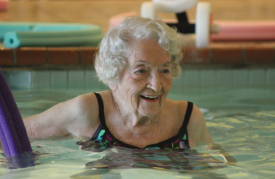
“I stay active here in my house. I did all my own yard work for years and years. Even when my husband was living, I did most of the yard work. I cut the grass on the lower level and on the front. (It is a big yard!) And I planted the flower borders all across the back and up the steps. I had it looking real pretty.”
Helen went to work right out of high school and pursued photography as a career. She was the premier portrait photographer in Lynchburg in the 1930s, running her own business out of her mother’s home. She described going into business for herself as the best financial decision of her life. “I had my workroom in my mother’s basement, and I used her dining room to set up my equipment and take pictures there. I enjoyed my work. Loved every minute of it. People would come to me from all over to have their photograph.”
Another piece of Helen’s active life is her love of travel. “I used to go everywhere, all over the world. Any time someone would say ‘Come on, let’s go,’ I’d go. My first trip to Europe, I was 27 years old. I just sort of got into the habit—I liked it—and started going every year.”
For Helen, the greatest thing about living to be 100-plus is “the devotion of my children. Don’t know what I would do without them. All four of them. They are the sweetest four girls that have ever lived in this world, and they’ll do anything for me.” Although the first in her family to reach 100, we doubt that she will be the last, given the vibrant, active legacy she has established for her family.
SECRET 5: CLEAN LIVING
When we asked Loren Cartwright what was his secret to an energetic 100-year lifespan, he looked straight in the camera and meticulously articulated with energy and gusto, “Good clean livin’!”
Charlie Surrey
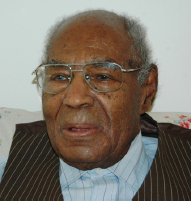
There is no question that this label can be defined an infinite number of ways, but as we listened to our centenarians and tabulated their responses, “clean living” was the phrase that we chose to identify this fifth-most-frequent number of responses to the secret question. So we won’t belabor an attempt to define the theme in detail, but we believe most of you will get the picture.
Almost 75 percent of our centenarians never smoked, and of the ones who did at one time, most stopped between the ages of 40 and 70. Walter Breuning was obviously the contrarian, smoking till 99 and living to 114-plus. No one is an excessive drinker or drug user, and no one has any serious criminal records.
Charlie Surrey, 101, was getting ready to go fishing with his younger brother (95) when we visited him. His answer was simple and pleasant. “Eat right, sleep right, and don’t get mad.”
“Just stay out of trouble. That’s all,” says Harry Adler, 101. Good advice for everybody at every age.
We loved Essie Smiley’s 100 wrap on this secret: “Clean living, no alcohol, no tobacco, plenty of sex.” There’s probably another whole book possibility with these thoughts!
Aunt Pauline Copeland, 100, echoed this theme with “hard work, clean living, no drinking or smoking or late hours, and faith in my heavenly Father.”
Edythe Thompson provided a thoughtful response for this category: “I suppose good heritage. Clean living, no smoking, a little drinking, and eating plenty of chocolate.”
Numerous other comments echo these similar words and phrases, constituting what we label clean living as one of our centenarians’ top 7 secrets to their special chronological status.
“Keep the 10 commandments, moderation in everything, treat others as you would have them treat you; clean life, happiness, exercise, good food, good friends, good church home; clean living, friends, and God; lead a quiet, productive life. No bad habits. Go to bed about 9:00 or 10:00. Get up at 7:00.”
“Live right, live for God, and treat your neighbors right.”
We believe it is worth your while to glean these comments and create your own clean living definition for contributing to your personal centenarian “menu” or “painting.”
3 DOs—3As
Kathryn Dwinnell has always contemplated living to 120. A devout Christian lady who is very knowledgeable of the Bible, she pointed out that in the book of Genesis, Chapter 6, verse 3, it states that our “. . . days will be a hundred and twenty years.” Thus her consideration of 120, and as she explained, it doesn’t matter if you make it or not. “It is something that could happen. I know beyond the shadow of a doubt that God can do anything. What I don’t know is will He with me.” Whether she reaches that supercentenarian number or not, her 107 years so far have been as full and representative of clean living as anyone we know. “I do know that I have to do my part. You have to take advantage of what God offers. So I’m doing my part. I’m exercising. There’s many times I’d much rather lay down on that daybed than go downstairs and exercise. But I need to go exercise. I’m eating right . . . pretty much—I still like fried foods (she says with a smile). A friend asked me if I would like some ‘fried food.’ I said, ‘Sure.’ She brought me ‘dried prunes.’ Background noise really interferes with my hearing!”
Kathryn Dwinnell
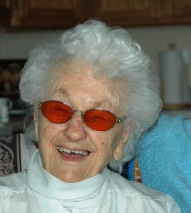
Born August 26, 1905, in Nebraska, she grew up with five older brothers on a farm. “I arrived ahead of the doctor. He was delivering another baby somewhere else in the county and I couldn’t wait!” She still lives in Lincoln, Nebraska, was married 70 wonderful years, and has four children.
Kathryn possesses an optimistic, enthusiastic philosophy about life no matter what the circumstances. When asked about her surviving the Great Depression, she offered some wise advice from experience, not theory. “Back in those days we lived on the 3 Dos: Make Do, Do Over, and Do Without. But we really didn’t do without. We did without luxuries and things that weren’t necessary. You rip something up and make something else out of it. Also, you have to Adjust, Adopt, and Accept. Now that’s something the Lord has given me. I can do all three graciously. Don’t think of the things that you’ve lost. I just think with a grin of the places my red shoes have been,” she chimes with a winsome smile from ear to ear.
Her secret to such a long and joyful life so far? “I do think my attitude. I was born with a good attitude and I think attitude makes a world of difference. You can take what somebody says as an insult or putting you down, or you can take it as just a statement and more or less a compliment. We had a friend whose language would curl your ears, and he would often say to me, ‘Katie, you’re a strong old biddy.’ And it was a compliment. Being called an old biddy could have insulted me, but instead of that, I loved to hear Jennings say that. So you see, it’s how you take things, and I think attitude makes all the difference in the world.”
The greatest thing to her about passing the century mark is that “Everyone is so nice. They all want to take care of me. Did you notice how those servers catered to me today at lunch? Years ago, I said that I was lucky. Now I say I’m blessed. There is no such thing as luck.”
She has a very simple definition of rich: “Being loved. Having friends. There is absolutely no one who has been nasty with me. I have everything I need, and I have no worries.”
Like most of our centenarians, Kathryn has paid for everything she can think of in cash—except for a washing machine, vacuum cleaner, and their first house. “We had a 10-year mortgage on our first home and paid it off in 9 years. We had two children and decided to buy the vacuum cleaner and washing machine ‘on time.’ Washing on that board was quite a chore.” We believe that is about as legitimate a reason imagineable for buying something ‘on time.’
If Kathryn had the opportunity, she would share her 107-plus years’ seasoned advice to the president as follows: “Ask God before you make any move, and do what He tells you.” You don’t need to be president to heed and implement that sage suggestion.
SECRET 6: FAMILY
As we mentioned in Chapter 2, a great deal of longevity research highlights the perceived importance of community, social support systems, and family to the overall mental and physical well-being of individuals. A lot of our centenarians defined the word rich (Chapter 3) as a loving family and close family relationships. When the word family emerges in conversations today, emotional responses range from high blood pressure to contagious smiles of pure pride and joy. Certainly, a good, happy, healthy family life situation contributes to a more enjoyable quality of life. But might it also positively impact the quality and quantity of our years?
Our centenarians seem to think so, ranking it sixth as a key secret to their long life, and an encouraging reason for wanting to live even longer, enjoy the love of family, and leave a legacy for them to possess and cherish. Hearing centenarians speak about their families warmed our hearts. Most have vivid and detailed remembrances about the good and challenging aspects of their family life when young and as the father or mother of the family they created.
It did not surprise us to hear them articulate that commitment, communication, appreciation, spiritual growth, “healthy” stress, and family crisis management are essential ingredients to strong families. The intimacy they still give and take to family is a key part of their continuing social development and enjoyment. We heard over and over again in affectionate terms how their spouse or children contributed or still contribute to their physical, mental, and spiritual health today.
Interestingly, over 65 percent of our centenarians grew up with three or more siblings, yet over 60 percent of them have two or fewer children. They have followed our national trend of smaller families, but overwhelmingly say family is vital and is the nucleus of their life. Following are some typical responses to the question “What activities do you most enjoy today?”
“Reading and family visits.”
Marguerite Ranard, 101
“Church activities and family.”
Emma Markert, 102
“I walk, shop, cook, and do as much as I can with my daughter and son-in-law. Seeing the grand and great grandchildren.”
Albina Sacchetti, 104
“Honoring my parents and family.”
Carroll Dietle, 100
So, as you can see, for many of our centenarians, healthy, loving families make the difference when the ups and downs of life occur, and are invaluable to their ability to survive and thrive into their “platinum” years.
Wise and Witty Centenarians
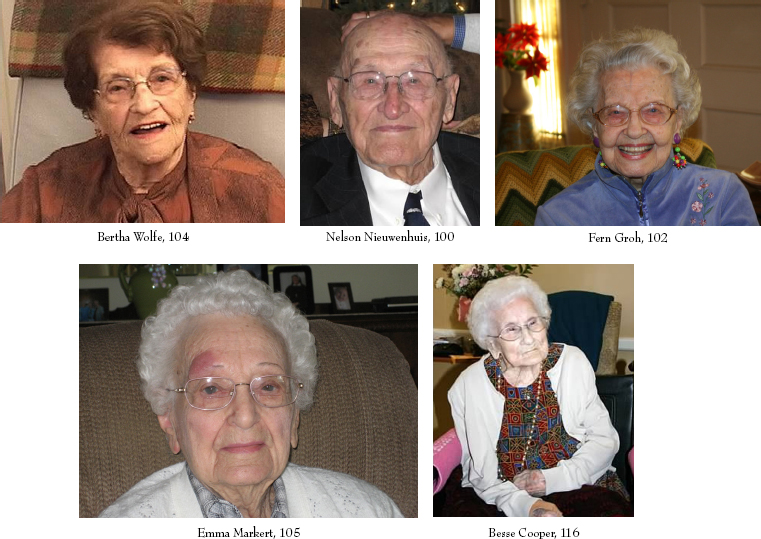
SECRET 7: GENETICS
As we reviewed earlier in the book, much research and study continue to inundate our scientific and medical world in efforts to determine the genetic linkage and predictability for living longer, and how to replicate the longevity genetic structures in people who are not so positively genetically inclined toward beyond-average life expectancy. Much scientific research suggests a strong correlation between people who have parents or siblings with long lives and their likelihood of the same, but many of our centenarians came from families with no family members living beyond their 60s.
Still, a few of our centenarians perceived that good genetics was their secret to living to be 100 and beyond.
“I came from a family of longevity.”
Leo Baley, 100
“Born with good genes and led a pretty healthy life.”
Alice Froemming, 101
Andy Weinandy, 100, laughingly replied, “I picked the right parents and genes!” Of course, his comment flew straight in the face of our friend Gordie Miller, who astutely observed, “It’s hard to pick your parents.”
So if you come from parents or grandparents with good long-life genes, or have siblings who have lived or are still living very long lives, consider yourself very lucky. You possess a higher probability than many of living long and reaching 100 or more.
But even if you are not so fortunate to come from a “genetic powerhouse” family, do not be discouraged. Neither did a large percentage of our centenarians, and the best news is that you have the other top six secrets that you can creatively, enthusiastically, and diligently incorporate into your daily schedule that will vastly improve your likelihood of getting into the centenarian club. In addition to these seven top categories that most of our responses created from the secrets question, there are a few jewels that we thought you needed to know about just in case none of the others appeal to you:
- “A wonderful and loving family, the good Lord, and a rum and Coke every afternoon.”
- “I do not know. I wish I did. I would sell it!”
- “I am just lucky.”
- “Mind my own business.”
- “My biggest job is to keep myself healthy. I question even drinking too much coffee. And I like coffee!”
- “Not dying.”
- “Regular table tennis, moderate eating, and I really believe that my marriage at 95 to a lovely woman 28 years younger than myself has made all the difference in my life.”
- “Relaxation and a sense of purpose.”
- “Take as little medication as you can.”
- “Vinegar and honey.”
- “Keep breathing!”
- “If I told you, it wouldn’t be a secret!”
We thought these would add to your smorgasbord and rainbow of secrets satisfaction and enjoyment.
ADVICE TO CENTENARIAN WANNABES
Many different questions were asked in our encounters with these marvelous people, all seeking to capture wisdom, wit, insight, and advice about money, work, and the many various aspects of life from their unique, long-term perspective. Since repetition is the “mother of all learning,” some answers may seem repetitious to you. They are. We want to ensure that you do not miss their simple but profound answers because they reflect not only living 100-plus years chronologically, but living 100-plus years wisely and well.
One of the questions we asked, somewhat related to our secrets question, was: “What advice about anything would you give to people who think they might want to live to be 100?”
Yin and Yang: Being and Doing
Most of their responses distinguished between what we must “be” and what we must “do” to enhance our possibilities for making it into the centenarian ranks with enjoyment and a sense of fulfillment. They are two aspects of an integrated, whole human being about which much has been researched and written in popular psychological and business literature.
As we reflected and listened to them articulate their advice for centenarian “wannabes,” it became apparent that their wisdom is about both being in the flow of life, patiently allowing it to happen, while at the same time doing life in an intentional, straightforward “make it happen” way with steady determination and resolve.
We believe this yin-and-yang full approach to living well and living wisely is no secret, but rather a reasonable series of practical choices made over a 100-year lifetime. Almost half of their advice to wannabes emphasized the importance of having a sound sense of being. About a third of their suggestions highlighted doing, and the balance of responses incorporated both fairly equally.
“Be faithful and trusting. Take it one day at a time.”
Louise Harry, 102
“Be accepting of what life brings and try to make others glad they passed your way.”
Rebecca Williamson, 100
“Be your own health advocate. Do not smoke and drink—seldom if at all. Live near people who are interested in your welfare. Participate in activities, sports, games, driving, clubs, etc.”
Floyd Ellson, 100
Bill Mohr

Bill Mohr’s father died when he was 3 years old. His sister was 18 months old. “It was absolutely awful. We didn’t have anything to eat at all. We knew what it was like to have just one meal a day. But we never took it too seriously.” He joined the Army in World War II at age 31 and received the French Legion of Honor Medal. “From a physical standpoint I was in good shape. I had all my teeth. Not a cavity in one of them.” He was injured in Europe, had surgery on his back, and “I had to learn to walk all over again. But the doc said I recovered better than anyone.” After the war he worked in several careers, retiring at age 93. “I loved my work, and they loved what I did. You have to enjoy your work if you want to get both pleasure and compensation from your work. I loved it.”
He shared some very wise advice to centenarian wannabes. “Find pleasure and joy in all your neighbors. Don’t be envious of your neighbors if they have a new car and you don’t. It’s all relative. See something beautiful in your surroundings. I was never envious of anybody, and there was no poorer kids on the street than my brother and I—none. Take one day at a time. Life is very big. What seems like the end of the world in your twenties, you won’t remember when you are 80 or 90. So relax and enjoy your youth.
“While living to be 100 is quite a bit in the genes, try to take life one day at a time. It is probably not the amount of years you live but the quality of life you put into whatever years you are blessed with.” Well said, soldier. Good orders for us all to follow.
“Eat properly. Only drink on social occasions. Keep active mentally. I read the New Yorker and the New York Times daily, play bridge with friends, and walk at least five times a week several blocks. Get checked by doctors and dentists regularly.”
Anne Halley, 100
“Hang in there, think positive, eat what is good for you, exercise, be happy, count your blessings—they are many.”
Fern Groh, 102
“Enjoy your life, friends, and work. Stay as healthy as you can. Do not drink or smoke. Keep it simple and as stress free as possible.”
Maynard Anthony White, 101
“Keep active, do things now while you can do it so you can keep on doing it. Keep satisfied and enjoy each year one at a time.”
Frederick Green, 100
“Three things: Maintain a healthy lifestyle, enjoy your family and friends, do nice things for others.”
Louise Calder, 100
We hope these few quotes that are representative of hundreds more suggestions are encouraging and heighten your centenarian wannabe desire. Not only will your journey to 100 be full of enjoyment, you may be delightfully surprised after blowing out all those candles.
WHY 100?
Occasionally, we meet people who, when discovering our interest and research on centenarians, ask this question in a somewhat sarcastic tone: “Why in the world would I want to live to be 100?” Perhaps never having met or read about active centenarians, they cannot imagine that anyone over 100 years old can still be doing much that is really fun. As you well know by now, they could not be more mistaken. Many of them are still having fun, energetically enjoying life and looking forward to each new day of life they are granted. Some of the fun activities they still enjoy and enthusiastically enjoyed telling us about included:
“Discussions with people who think.”
Marvin Kneudson, 100
“Ride my bike, play organ, music director for church.”
Louis Reitz, 101
“Cooking, crocheting and knitting; also writing letters to my relatives and friends.”
Frances Jacobs, 100
“Reading my Bible and other Christian literature, crossword and circle word puzzles.”
Anna Orr 100
“Reading, having friends visit, exercise class, jigsaw puzzles.”
Doris Parker, 102
“Visiting with my family, flowers, and bird watching.”
Anna Maria Fierro,100+
“Golf.”
Helen MacDonald, 103
“Making crafts, watching television, and playing cards.”
Catherine Anna Habraken, 101
“Attending Quest—a community for lifelong learning.”
Ruth Proskauer Smith 101
“Playing games, being with friends, doing my volunteer work.”
Marion Rising, 101
“Visiting with friends, talking about old times, listening to music, and watching people dance.”
Bessie Minton, 106
“Dancing, watching international news, fraternizing with neighbors.”
Richard Morris, 102
“Sew new clothes.”
Stella Kartt, 102
“Bingo, reading, visiting with friends and family.”
Irma Ferguson, 100+
“Lodge work and church volunteer at food bank.”
Mary Kuhn, 100
“Baking bread and flying with my son.”
Les Oldt, 107
“Making glass bead flowers and rag blankets.”
Rosalie Wolosenka, 101
Pauline Copeland, 100

So you can see there is no moss growing under these centenarians’ feet. They are living testimonies to just how long and vibrant and interesting and meaningful life can be if you approach it with a positive, optimistic mind-set. We hope you agree that they are encouraging answers to “Why 100?” and that by now you are a raving centenarian wannabe. You have the secrets, wise advice, and glimpse of what life up to and beyond 100 can enjoyably look like. Now you just need to “catch the spirit.”
Esther Robinson, 101, and Mary Stalnaker, 101
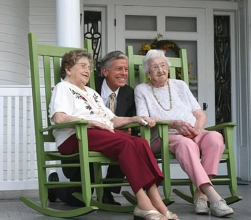
Emma Johnson, 102

